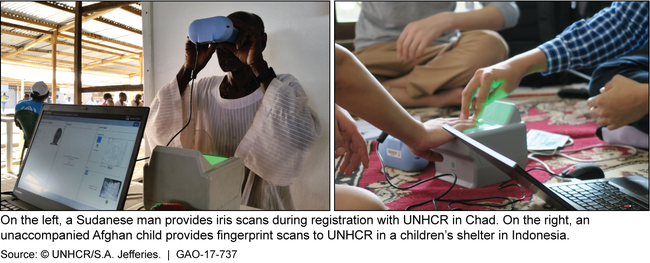This post first appeared on GAO Reports. Read the original article.
What GAO Found
The Department of State (State) and the United Nations High Commissioner for Refugees (UNHCR) have worked together on several measures designed to ensure integrity in the resettlement referral process. State and UNHCR have established a Framework for Cooperation to guide their partnership, emphasizing measures such as effective oversight structures, close coordination, and risk management. Working with State, UNHCR has implemented standard operating procedures and other guidance that, according to UNHCR officials, provide baseline requirements throughout the referral process. UNHCR also uses databases to help verify the identities of and manage information about refugees. These systems store biographic information such as names, personal histories, and the types of persecution refugees experienced in their home countries. They also maintain biometric information, such as iris scans and fingerprints.
Figure: Technology that the United Nations High Commissioner for Refugees (UNHCR) Uses to Register and Verify Refugees

To reduce the risk of fraud committed by staff at the nine Resettlement Support Centers (RSC) worldwide, State and RSCs have instituted several antifraud activities, many of which correspond with leading antifraud practices, but key gaps remain. Overseen by State, the organizations that operate RSCs hire staff to process and prescreen applicants who have been referred for resettlement consideration. According to State and RSC officials, RSCs have experienced staff fraud. Officials said that instances of staff fraud are uncommon, but they illustrate risks to the integrity of RSC operations. To manage these risks, State and RSCs have established a number of activities consistent with leading antifraud practices. For example, officials from all nine RSCs stated that they assign staff fraud risk management responsibilities to designated individuals. State has also worked with RSCs to develop and implement controls to ensure program integrity. However, RSCs face challenges implementing some of these controls. Additionally, State has not required RSCs to conduct regular staff fraud risk assessments tailored to each RSC or examined the suitability of related control activities. Without taking additional steps to address these issues, State and RSCs may face challenges in identifying new staff fraud risks or gaps in the program’s internal control system as well as designing and implementing new control activities to mitigate them.
Why GAO Did This Study
According to UNHCR, as of the end of 2015, more than 21 million people had become refugees. In fiscal year 2016, the United States admitted nearly 85,000 refugees. State manages the U.S. refugee admissions program (USRAP). UNHCR referred 61 percent of the refugees considered by the United States for resettlement from October 2011 to June 2016, and State worked with staff hired by nine RSCs to process their applications. Deterring and detecting fraud is essential to ensuring the integrity of USRAP.
GAO examined (1) how State works with UNHCR to ensure program integrity in the UNHCR resettlement referral process and (2) the extent to which State and RSCs follow leading practices to reduce the risk of fraud committed by RSC staff. GAO analyzed State and UNHCR data and documents; interviewed relevant officials; conducted fieldwork at UNHCR offices in Denmark, El Salvador, Jordan, Kenya, and Switzerland; interviewed senior officials from all nine RSCs; and visited RSCs in Austria, Jordan, Kenya, and a suboffice in El Salvador. This report is based on GAO-17-446SU, with certain sensitive information removed.
What GAO Recommends
To better assess and manage risks of fraud committed by staff at RSCs, State should actively pursue efforts to ensure RSCs comply with program integrity measures; require each RSC to conduct regular risk assessments tailored to its operations; and use these assessments to design, implement, and revise control activities to mitigate risks of staff fraud. State agreed with GAO’s recommendations.
For more information, contact Thomas Melito at (202) 512-9601 or melitot@gao.gov.
